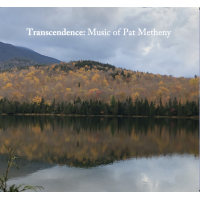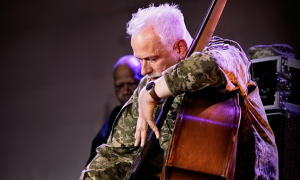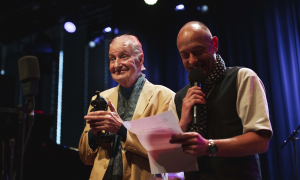Home » Jazz Articles » Profile » Phil Woods: Philology
Phil Woods: Philology
Jim McNeely
composer / conductorb.1949

Hal Galper
piano1938 - 2025
"Well," Woods told McNeely afterwards, "we've had a freebie, a cancelled gig and a wedding. Welcome to the Number One jazz band."
When Woods brings his Quintet into Dizzy's Club this month the band, a quartet in its earliest incarnations and a quintet, first in 1976-77 and permanently since 1983, will be entering its 36th year with original members Woods, bassist Steve Gilmore and drummer Bill Goodwin. On trumpet will be

Brian Lynch
trumpetb.1956

Bill Charlap
pianob.1966

Bill Mays
pianob.1944
"Our three original members will soon pass the Modern Jazz Quartet in terms of jazz band tenure," says Goodwin, who also produces most of the band's recordings. "I've surpassed

Connie Kay
drums1927 - 1994

Sonny Greer
drums1895 - 1982
Woods' own career (he'll turn 78 later this year) predates the formation of the Quartet/Quintet by over two decades. He was an established star by the late '50s and right through the following decade, working with big bands led by

Charlie Barnet
saxophone1913 - 1991

Buddy Rich
drums1917 - 1987

Dizzy Gillespie
trumpet1917 - 1993

Michel Legrand
piano1932 - 2019

Quincy Jones
arranger1933 - 2024
Early in his career, Encyclopedia of Jazz author Leonard Feather said Woods "has inherited the

Charlie Parker
saxophone, alto1920 - 1955

Cannonball Adderley
saxophone1928 - 1975
"What really knocked me out about Phil," recalled McNeely, "was that he could play a line and every note had a different inflection to it and a little different articulation. He never just ran out a string of eighth notes, he always was sculpting the line in certain ways with his melodic sense. He's got wonderful technique but the great thing there too is he doesn't hit you over the head with it; the technique is a means to a greater end, so it's not like you're hearing a guy with a lot of chops, you're hearing a great musician expressing himself fully. And Phil is such a strong player, especially with time, something we could really feel since we usually played acoustically, so it was like a chamber group except very high energy."
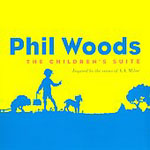 Catching up with Woods on the phone from his home at the Gap, he was busy adding arrangements from a trove of
Catching up with Woods on the phone from his home at the Gap, he was busy adding arrangements from a trove of 
Al Cohn
saxophone, tenor1925 - 1988
"Yeah," said Woods, "we finally got it recorded by my [8-piece] Little Big Band plus a string quartet, with singers

Bob Dorough
vocals1923 - 2018
A suggestion that some new young alto saxophonists appearing on the jazz scene are today hailed as "the new Phil Woods," just like he was once hailed as the "new Charlie Parker," prompted this response from Woods:
"They listen to me and they're getting it second hand. Always go to the masters, the guys that invented this stuff: Bird," data-original-title="" title="">Louis Jordan, Cannonball,Louis Jordan
saxophone, alto
1908 - 1975" data-original-title="" title="">Johnny Hodges, Willie Smith, Pete Brown from Staten Island, a favorite of mine not often remembered and of course the greatJohnny Hodges
saxophone, alto
1907 - 1970" data-original-title="" title="">Benny Carter, one of the first cats I ever heard. I always tell the young players 'don't be a one trick pony,' listen to everybody, not just the most fashionable and the most popular. If you find me as one of your ingredients fine, but don't be myopic. I didn't just copy Charlie Parker, I listened to the alto sax played by people who knew how to play and made an amalgam of it all."Benny Carter
saxophone, alto
1907 - 2003
Woods has fond memories of his early years, the '50s-60s, when all the major labels had subsidiaries that put out big band and orchestral projects. He's proud to have worked with such leaders/arrangers as Manny Albam,

Oliver Nelson
saxophone1932 - 1975

Neal Hefti
trumpet1922 - 2008
Bill Potts
b.1928"God bless Mosaic [the reissue label] for making Oliver's and Johnny Richards' wonderful stuff available," he says. "I remember subbing for Gene Quill [his partner in the two alto sax quintet of the time, Phil & Quill] in the Richards band at Birdland. After playing until almost 4 am, Johnny would bring out new arrangements and we'd rehearse until breakfast time. That's when giants walked the earth."
 Many fans and musicians would say that Woods is also one of those giants of jazz, notably Paolo Piangiarelli, who named his record label, Philology, for Woods, dedicating the label to "documenting authentic legends of jazz [mostly Woods and fellow alto legend Lee Konitz] and preserving the music of this genius of jazz." The Phil Woods discography on the label numbers 40 albums and counting. Goodwin has lost count of the recordings he's done with the Quartet/Quintet, Little Big Band and Big Band, but he says the band's book has over 300 charts and is constantly expanding.
Many fans and musicians would say that Woods is also one of those giants of jazz, notably Paolo Piangiarelli, who named his record label, Philology, for Woods, dedicating the label to "documenting authentic legends of jazz [mostly Woods and fellow alto legend Lee Konitz] and preserving the music of this genius of jazz." The Phil Woods discography on the label numbers 40 albums and counting. Goodwin has lost count of the recordings he's done with the Quartet/Quintet, Little Big Band and Big Band, but he says the band's book has over 300 charts and is constantly expanding."Phil's band is almost a writer's workshop," says McNeely. "He likes to play a lot of different kinds of things and wrote a lot himself as well as encouraging us to write. And it was great to write for a band with such a constant personnel, you know everybody's strengths and weaknesses. And everyone in the band could read so well that we could run a tune at a sound check and then begin playing it on the gig right away. When I was leaving the band and Phil and Bill decided to record a whole album of my works [The Phil Woods Quintet Plays the Music of Jim McNeely on TCB], it was like a classical composer being asked to do an album for the Emerson String Quartet or some other really established ensemble, a real honor."
Woods has a busy schedule this spring, from an April appearance at Jack Kleinsinger's Highlights in Jazz series to dates in Europe, but he's not very sanguine about the future of jazz these days. "Europe is pretty quiet and it's going to get worse," he predicts. "A festival in London just cancelled and that's just the tip of the iceberg. European festivals have kept American jazz musicians alive for years but I have a feeling it's over, we're getting to the swan song, the bread has dried up and there won't be many more straight-ahead jazz festivals."
But meanwhile, Woods is more optimistic about his local jazz scene in the Poconos, where he's looking forward to the 33rd annual Delaware Water Gap Celebration of the Arts (COTA) festival in September, an event he co-founded with trombonist Rick Chamberlain, and to reviving a jazz summer school that has been "my dream since the jazz camp we had in New Hope in the '60s that

Michael Brecker
saxophone, tenor1949 - 2007

Richie Cole
saxophone, alto1948 - 2020
Recommended Listening:
Phil Woods, Rights of Swing (Candid, 1960-61)
Phil Woods & His European Rhythm Machine, At The Frankfurt Jazz Festival (Atlantic, 1970)
Phil Woods, Musique Du Bois (Muse-32 Jazz-Pony Canyon, 1974)
Benny Carter/Phil Woods, Another Time, Another Place (Evening Star, 1996)
Phil Woods, The Solo Album (Philology, 2000)
Phil Woods/Los Angeles Jazz Orchestra, Unheard Herd (Jazzed Media, 2004)
Tags
Phil Woods
Profiles
George Kanzler
Jim Eigo, Jazz Promo Services
United States
New York
New York City
Jim McNeely
Hal Galper
Brian Lynch
Bill Charlap
Bill Mays
Connie Kay
Sonny Greer
Charlie Barnet
Buddy Rich
Dizzy Gillespie
Michel Legrand
Quincy Jones
Charlie Parker
Cannonball Adderley
Al Cohn
Bob Dorough
Louis Jordan
Johnny Hodges
Benny Carter
Oliver Nelson
Neal Hefti
Bill Potts
Mike Brecker
Richie Cole
Comments
PREVIOUS / NEXT
Support All About Jazz
 All About Jazz has been a pillar of jazz since 1995, championing it as an art form and, more importantly, supporting the musicians who make it. Our enduring commitment has made "AAJ" one of the most culturally important websites of its kind, read by hundreds of thousands of fans, musicians and industry figures every month.
All About Jazz has been a pillar of jazz since 1995, championing it as an art form and, more importantly, supporting the musicians who make it. Our enduring commitment has made "AAJ" one of the most culturally important websites of its kind, read by hundreds of thousands of fans, musicians and industry figures every month.
Go Ad Free!
To maintain our platform while developing new means to foster jazz discovery and connectivity, we need your help. You can become a sustaining member for as little as $20 and in return, we'll immediately hide those pesky ads plus provide access to future articles for a full year. This winning combination vastly improves your AAJ experience and allow us to vigorously build on the pioneering work we first started in 1995. So enjoy an ad-free AAJ experience and help us remain a positive beacon for jazz by making a donation today.

New York City
Concert Guide | Venue Guide | Local Businesses
| More...


 When pianist
When pianist 



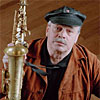



 Buy Now
Buy Now



